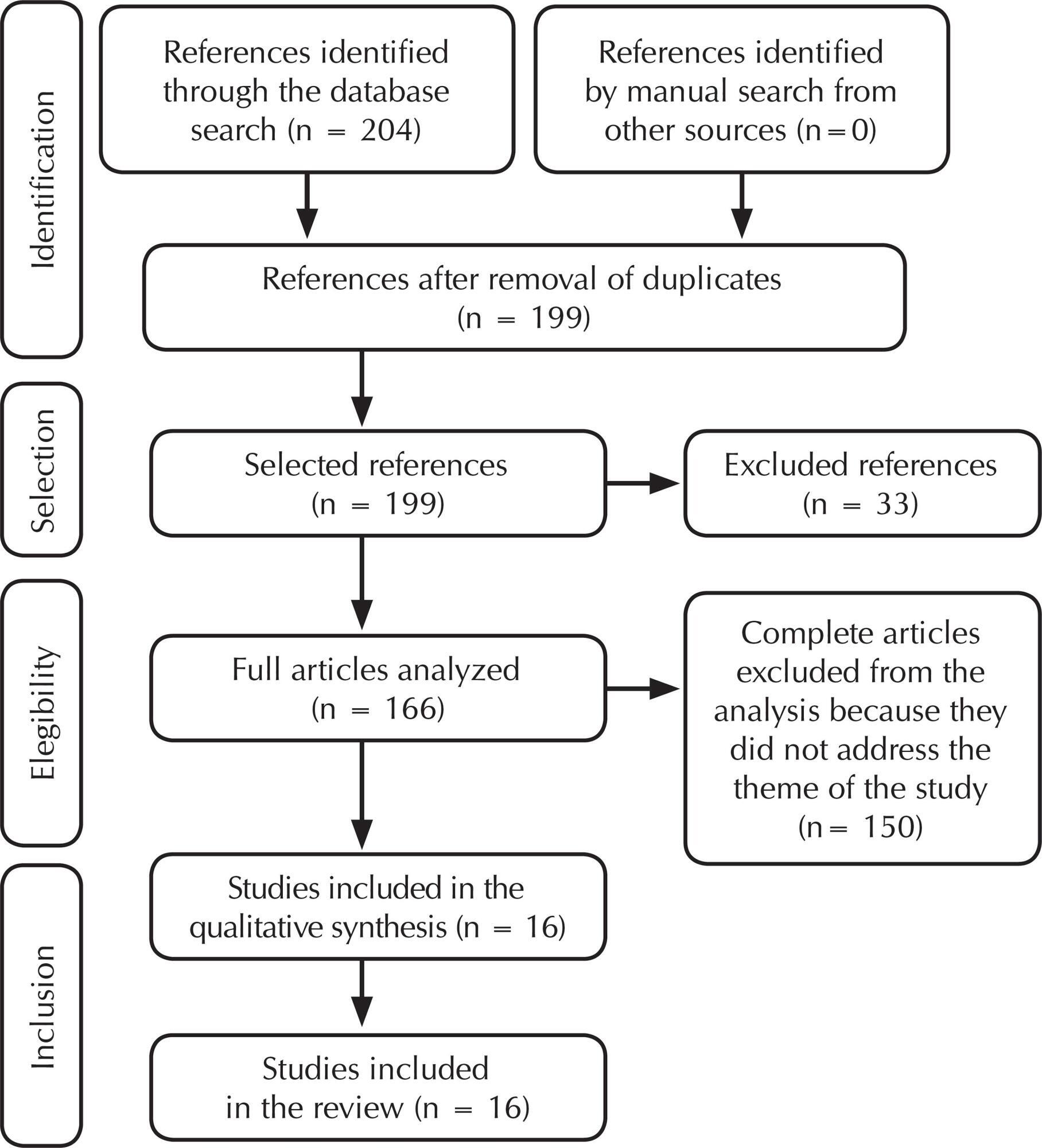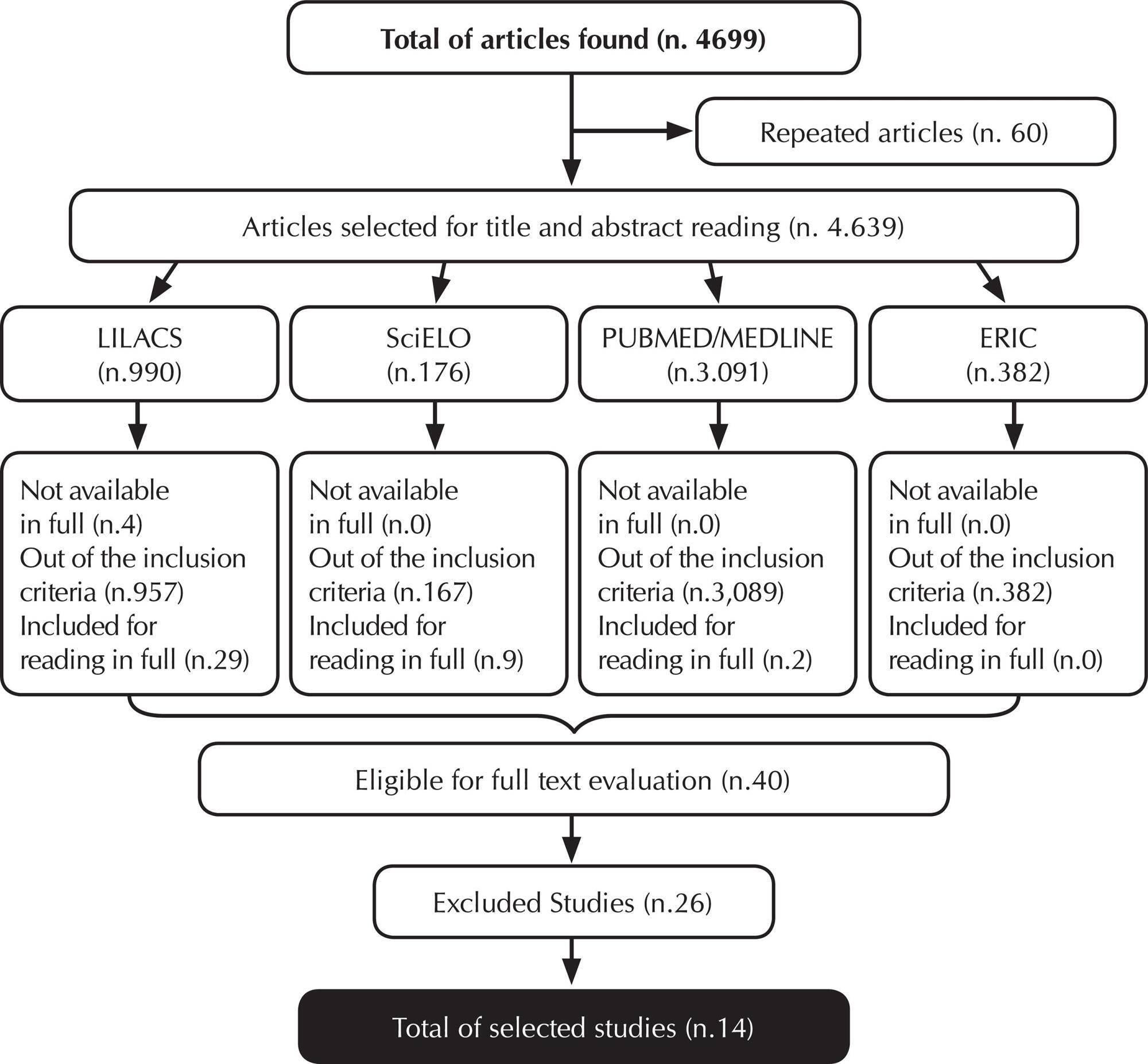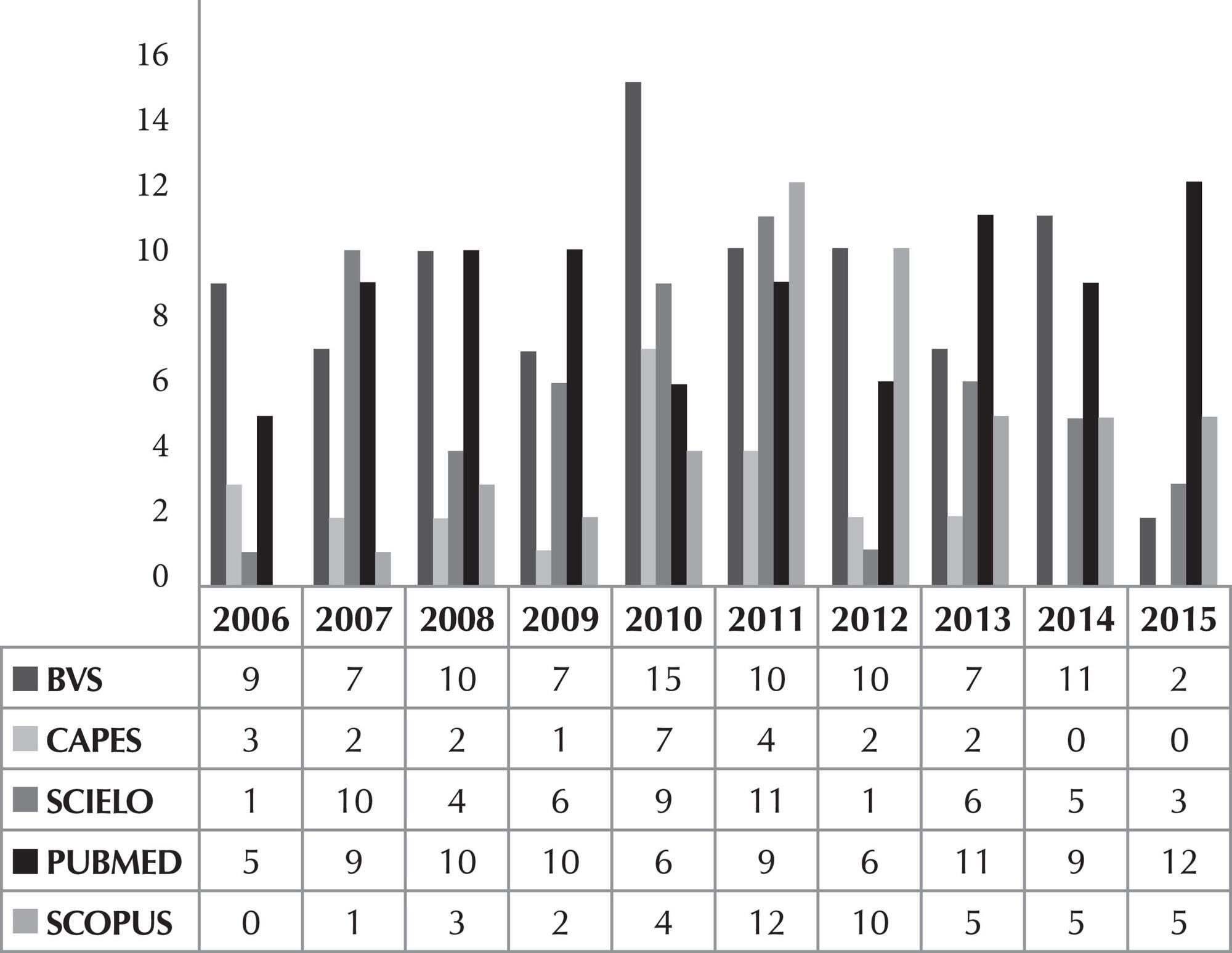-
EXPERIENCE REPORT01-01-2018
Death education: sensibility for caregiving
Revista Brasileira de Enfermagem. 2018;71:1779-1784
Abstract
EXPERIENCE REPORTDeath education: sensibility for caregiving
Revista Brasileira de Enfermagem. 2018;71:1779-1784
DOI 10.1590/0034-7167-2017-0018
Views0See moreABSTRACT
Objective:
to report the application of a participatory teaching-learning method on the themes death, dying, and associate care to highlight its applicability to the students.
Method:
report of application of participatory method in 22 students from the 6th period of the undergraduate program in Nursing and Obstetrics of a public university. The first stage focused on personal experiences of the students and the second on professional prospects. As resources for data collection we used music, drawing, drama, and photography.
Results:
after applying the method, the students assigned meanings to death and nursing care, reflected, criticized, and resignified experiences on the theme.
Conclusion:
the method was considered applicable and effective to achieve the objective, that is, it enables learners to act as protagonists of the teaching-learning process, building together a new perspective of end-of-life care.
-
EXPERIENCE REPORT01-01-2018
Community intervention in the Nursing education: experience report
Revista Brasileira de Enfermagem. 2018;71:1774-1778
Abstract
EXPERIENCE REPORTCommunity intervention in the Nursing education: experience report
Revista Brasileira de Enfermagem. 2018;71:1774-1778
DOI 10.1590/0034-7167-2017-0351
Views0See moreABSTRACT
Objective:
To report the implementation and results of community intervention projects used as a strategy for teaching and developing people and communities in the training of community health nursing specialists at the Centro de Formação de Saúde Multiperfil (Multi-profile Health Training Center), Angola.
Method:
Report of experience of the use of community intervention projects in nursing.
Results:
Community intervention projects have contributed to the learning of students and to the promotion of health, citizenship and the empowerment of individuals and communities. Its implementation is in the fourth year, and 16 projects have already been developed in 2 distinct neighborhoods, and this year the intervention will cover a third.
Conclusions:
Nursing teaching should adopt strategies that lead the student not only in the path of professional autonomy, but, above all, in the empowerment of people and communities. Community intervention is undoubtedly important in this area.
-
EXPERIENCE REPORT01-01-2018
The Pororoca effect on permanent education in health: about the interaction research-work
Revista Brasileira de Enfermagem. 2018;71:1768-1773
Abstract
EXPERIENCE REPORTThe Pororoca effect on permanent education in health: about the interaction research-work
Revista Brasileira de Enfermagem. 2018;71:1768-1773
DOI 10.1590/0034-7167-2017-0462
Views0See moreABSTRACT
Objective:
to build municipal responsibility with the permanent education in health policy from the interaction between research and innovation of work practices.
Method:
experience reports structured through dialogic meetings that allowed the participative diagnosis and strategic administration considering research in health education.
Results:
from the activities and interactions, we identified active forces in the reinvention of training for workers in the municipal network of health services, in which we found three streams: “inside and outside interactions”, “movement towards meetings” and “strategic collective arrangements”.
Final considerations:
through action research and a collaborative critique, collective movements were constructed, they showed ways to produce new directions in health education and allowed the strategic creation of the Núcleo de Educação Permanente as a responsibility of the municipal government, not depending on Federal policies.
-
REVIEW01-01-2018
Educational technologies and practices for prevention of vertical HIV transmission
Revista Brasileira de Enfermagem. 2018;71:1759-1767
Abstract
REVIEWEducational technologies and practices for prevention of vertical HIV transmission
Revista Brasileira de Enfermagem. 2018;71:1759-1767
DOI 10.1590/0034-7167-2016-0333
Views0See moreABSTRACT
Objective:
to assess available evidence on educational technologies and practices for prevention of vertical HIV transmission.
Method:
LILACS, PubMed, Scopus, BDENF, between April and May 2016, with the descriptors: “Vertical Transmission of Infectious Disease”, “HIV”, “Health Education” and “Technology”.
Results:
there are 16 articles published between 2000 and 2014, mostly Brazilian and African, Cross-sectional and with low level of evidence. The studies covered the use of hard technologies, through video, radio and telephone, and soft, emphasizing, in particular, counseling.
Conclusion:
the studies recognize the importance of educational activities as a tool for health promotion in the context of vertical HIV transmission, despite reporting the need for constant training of professionals and urgency in the renewal of educational concepts and practices. Therefore, it is recommended to expand and consolidate health counseling and emphasize the role of nurses as an important actor in this setting.

-
REVIEW01-01-2018
Liberating critical pedagogy of Paulo Freire in the scientific production of Nursing 1990-2017
Revista Brasileira de Enfermagem. 2018;71:1751-1758
Abstract
REVIEWLiberating critical pedagogy of Paulo Freire in the scientific production of Nursing 1990-2017
Revista Brasileira de Enfermagem. 2018;71:1751-1758
DOI 10.1590/0034-7167-2017-0699
Views0See moreABSTRACT
Objective:
To analyze the theoretical and methodological application of Paulo Freire’s critical pedagogy in the scientific production of nursing.
Method:
An integrative review was carried out with consultation of the databases: LILACS, BDENF, MEDLINE, PUDMED and CINHAL. We included studies in the Spanish, English and Portuguese languages, published from 1990 to 2017.
Results:
A total of 38 articles were analyzed, of which the main concepts adopted were: dialogue/dialogicity, awareness/critical awareness and questioning. Regarding the application of the method, it was noticed the predominance of the adoption of elements such as culture circles, thematic phase and horizontality relation of the nurse with the individuals involved.
Conclusion:
Nursing has partially appropriated the Freire’s referential. However, it reveals the intentionality of a transformative practice that requires deepening for the implementation of the method in its full.

-
REVIEW01-01-2018
Supervised internship in undergraduate education in nursing: integrative review
Revista Brasileira de Enfermagem. 2018;71:1740-1750
Abstract
REVIEWSupervised internship in undergraduate education in nursing: integrative review
Revista Brasileira de Enfermagem. 2018;71:1740-1750
DOI 10.1590/0034-7167-2017-0340
Views0See moreABSTRACT
Objective:
to analyze the evidence available in the literature on the contributions of the Supervised Internship in nursing training in Brazil and the teaching-learning methods employed.
Method:
integrative review of the literature, with search of articles published between 2002 and 2016, in PubMed, LILACS, SciELO and Eric databases.
Results:
Of the 4,699 articles consulted, 14 met the inclusion criteria. The analysis of these studies revealed three thematic categories: the understanding about the role of Supervised Internship; the teaching-learning processes employed; and their contributions to the training of nurses.
Final considerations:
this is a fundamental element in the academic training, since, depending on the didactic-pedagogical organization, it makes possible the (re) signification of the acquired knowledge throughout the course and realizes the professional competences. The teaching-learning methods are structured by the critical pedagogy, being the active methodologies the main choices of the authors.

-
REVIEW01-01-2018
Nursing higher education in MERCOSUR: a bibliometric study
Revista Brasileira de Enfermagem. 2018;71:1732-1739
Abstract
REVIEWNursing higher education in MERCOSUR: a bibliometric study
Revista Brasileira de Enfermagem. 2018;71:1732-1739
DOI 10.1590/0034-7167-2017-0405
Views0See moreABSTRACT
Objective:
to identify productions that approach nursing high education in member states of MERCOSUR.
Method:
bibliometric study with quantitative approach carried out in search mechanisms, such as BVS, Capes, SciELO, Scopus and PubMed, between 2006 and 2015. It was found 301 articles about nursing education in MERCOSUR.
Results:
point to concern for the nurse’s education for public health policies, for teacher’s education and the teaching-learning process. However, publications regarding technologies associated with distance education on health field are low.
Conclusion:
this study contributes with discussion in nursing education field when points to the themes regarding the production about nurses’ education in MERCOSUR, specially, the range of targets set up in the Educational MERCOSUR agreement.

-
REVIEW01-01-2018
Educational technologies for health education on stroke: an integrative review
Revista Brasileira de Enfermagem. 2018;71:1724-1731
Abstract
REVIEWEducational technologies for health education on stroke: an integrative review
Revista Brasileira de Enfermagem. 2018;71:1724-1731
DOI 10.1590/0034-7167-2017-0041
Views0See moreABSTRACT
Objective:
to identify in the scientific literature the educational technologies used in the health education process related to stroke.
Method:
integrative review, whose eligibility criteria of the articles were: match the keywords “health education” and “stroke”; be a research paper; be in Portuguese, English and Spanish; be available electronically in the databases LILACS, PubMed/Medline, Scopus and CINAHL; year of publication between 2000 and 2016.
Results:
24 publications were found. The analysis was carried out by means of analytical and interpretive readings. There were many educational technologies used in the health education process for stroke.
Final considerations:
the printed material for general public stood out, aiming to the recognition of alert signs of the disease and the emergency decision-making before suspicious cases of the disease.
-
ORIGINAL ARTICLE10-21-2019
Burnout assessment in nurses from a general emergency service
Revista Brasileira de Enfermagem. 2019;72(6):1457-1463
Abstract
ORIGINAL ARTICLEBurnout assessment in nurses from a general emergency service
Revista Brasileira de Enfermagem. 2019;72(6):1457-1463
DOI 10.1590/0034-7167-2017-0870
Views0See moreABSTRACT
Objective:
To assess the level of Burnout among nurses in a general emergency department.
Method:
Quantitative, descriptive, correlational and cross-sectional study. 32 nurses from a general adult emergency department answered a questionnaire to evaluate Burnout. (Copenhagen Burnout Inventory).
Result:
It was verified that 59.4% of the nurses presented total Burnout. Work-related burnout was the subscale with the highest average score. It was found that the lower the age and the longer the time working in the institution, the higher the level of Burnout. Longer professional experience was related to lower levels of Burnout. There were also higher scores of Burnout among participants who thought about changing their profession, their institution or their service.
Conclusion:
The prevalence of Burnout is high. Professional Burnout was the most critical subscale. Age and the current work are the subscales that most influence perceived Burnout
-
REFLECTION03-05-2021
The nurse’s work in the context of COVID-19 pandemic
Revista Brasileira de Enfermagem. 2021;74:e20200594
Abstract
REFLECTIONThe nurse’s work in the context of COVID-19 pandemic
Revista Brasileira de Enfermagem. 2021;74:e20200594
DOI 10.1590/0034-7167-2020-0594
Views0See moreABSTRACT
Objective:
Reflect on the work experienced by the nurse in coping with the COVID-19 pandemic in a public hospital of the State of Rio Grande do Norte.
Methods:
Reflective essay based in the professional experience in a public reference hospital for the care of patients affected by COVID-19 in the State of Rio Grande do Norte. Results were organized in two empirical categories, which emphasize potentialities and barriers in the nurse’s work in the face of the COVID-19, presented by means of Ishikawa diagram.
Results:
Two categories emerged from the experiences: Nursing leadership in organizing health services to face COVID-19; and the performance of nursing care management in the COVID-19 pandemic.
Final considerations:
It is necessary to value the nurse’s work in all its attributes, as well as strengthen the interdisciplinary work processes, which collaborate to overcome the crisis caused by the pandemic.

-
ORIGINAL ARTICLE07-10-2020
Nursing appeals on social media in times of coronavirus
Revista Brasileira de Enfermagem. 2020;73:e20200225
Abstract
ORIGINAL ARTICLENursing appeals on social media in times of coronavirus
Revista Brasileira de Enfermagem. 2020;73:e20200225
DOI 10.1590/0034-7167-2020-0225
Views0See moreABSTRACT
Objective:
to know and analyze the nursing appeals on social media during the COVID-19 pandemic.
Method:
it is a documentary, qualitative, descriptive, and exploratory research with data collected in publications in two social media. Two hundred ninety-five publications of nursing professionals published on Twitter and Instagram between March 11 and 20, 2020 were submitted to content analysis using ATLAS.ti resources.
Results:
four thematic categories emerged: #stayathome, #whereismyPPE, #nowweareheroes, #nothingnewinthefrontline, according to frequency of communications. The appeals show a relationship with the social relevance of nursing professional work and with the conditions required for its exercise.
Final considerations:
old and new challenges of the profession were placed on the agenda in social media, especially related to the workforce and instruments of labor. These speeches can serve as a foundation for policies to improve working conditions and promote appreciation of the profession.

-
ORIGINAL ARTICLE06-09-2020
Stress of nursing professionals working in pre-hospital care
Revista Brasileira de Enfermagem. 2020;73(2):e20180660
Abstract
ORIGINAL ARTICLEStress of nursing professionals working in pre-hospital care
Revista Brasileira de Enfermagem. 2020;73(2):e20180660
DOI 10.1590/0034-7167-2018-0660
Views0See moreABSTRACT
Objectives:
To analyze the factors related to the occupational stress of a Mobile Emergency Care Service (Samu) nursing team.
Methods:
This is a descriptive study, with a quantitative approach, performed with nursing professionals from Samu service of a city of Pernambuco. A sociodemographic questionnaire and the Lipp’s Stress Symptom Inventory were used.
Results:
The participants presenting stress (24.6%) were classified in the phases: resistance (19.7%), exhaustion (4.4%) and near exhaustion (0.5%). It was also observed an association of stress level with the following factors: gender, sleep quality, professional autonomy restriction, emotional exhaustion with work performed and work in inadequate or unhealthy physical facilities.
Conclusions:
Although showing low occurrence of stress, this study pointed out the profile that presents the highest risk of developing occupational stress, through the factors significantly associated with stress in the studied population.
-
ORIGINAL ARTICLE08-19-2019
Mobile application for the teaching of the International Classification for Nursing Practice
Revista Brasileira de Enfermagem. 2019;72(4):1020-1027
Abstract
ORIGINAL ARTICLEMobile application for the teaching of the International Classification for Nursing Practice
Revista Brasileira de Enfermagem. 2019;72(4):1020-1027
DOI 10.1590/0034-7167-2018-0751
Views0See moreABSTRACT
Objective:
Developing a mobile application for the teaching of the International Classification for Nursing Practice.
Methods:
Methodological applied research for technological production, performed in three phases of the contextualized instructional design model: analysis, design and development.
Results:
The application has an initial screen, which provides information about the team and its purpose. Then, four moblets are listed, including presentation, user’s guide consisting of five modules, educational games and five clinical cases. The references on which the application was based are also presented.
Final considerations:
It was possible to develop an application with the potential to promote the knowledge of nursing students and professionals about this classification system.

-
REFLECTION06-29-2020
Children’s (in)visibility in social vulnerability and the impact of the novel coronavirus (COVID-19)
Revista Brasileira de Enfermagem. 2020;73:e20200302
Abstract
REFLECTIONChildren’s (in)visibility in social vulnerability and the impact of the novel coronavirus (COVID-19)
Revista Brasileira de Enfermagem. 2020;73:e20200302
DOI 10.1590/0034-7167-2020-0302
Views0See moreABSTRACT
Objective:
To examine the impact of the infection by the novel coronavirus on Brazilian children in situation of social vulnerability based on the Millennium Sustainable Development Goals.
Method:
Reflective study based on discursive formulation in three aspects: principles of the objectives and goals for the millennium sustainable development; impact of the pandemic on the health of children and their families living in social vulnerability; and the role of pediatric nursing in the care provided – limits and challenges.
Results:
In January 2020, the news of COVID 19 is released as a pandemic. In Brazil, children and families are still without access to basic rights, thereby increasing their risks of social vulnerability because of the quarantine. The nursing field has an important role in monitoring children and their families, offering guidance in search for solutions and preventing contamination.
Conclusion:
There are still challenges to be overcome by the children and their families in situations of vulnerability against COVID-19.
-
ORIGINAL ARTICLE08-18-2021
Effects of floral therapy on labor and birth: a randomized clinical trial
Revista Brasileira de Enfermagem. 2021;74:e20210079
Abstract
ORIGINAL ARTICLEEffects of floral therapy on labor and birth: a randomized clinical trial
Revista Brasileira de Enfermagem. 2021;74:e20210079
DOI 10.1590/0034-7167-2021-0079
Views0INTRODUCTIONThe Policy of Comprehensive Attention to Women’s Health focuses on improving obstetric care. One of the points observed in the Program of Comprehensive Attention to Women’s Health is the monitoring of pacts to reduce the rate of cesarean sections in hospitals of the Brazilian Unified Health System (SUS – Sistema Único de Saúde), rescuing the […]See more
-
ORIGINAL ARTICLE06-27-2019
Health literacy of adults with and without arterial hypertension
Revista Brasileira de Enfermagem. 2019;72(3):646-653
Abstract
ORIGINAL ARTICLEHealth literacy of adults with and without arterial hypertension
Revista Brasileira de Enfermagem. 2019;72(3):646-653
DOI 10.1590/0034-7167-2018-0366
Views1See moreABSTRACT
Objective:
Assess the level of health literacy of adults, with and without hypertension, treated in three basic health units (UBS) in Picos, Piauí.
Methods:
Cross-sectional study conducted with 357 adults. Data were collected using a questionnaire with sociodemographic variables, and literacy was assessed by the Test of Functional Literacy in Adults. Descriptive analysis was performed followed by the association between literacy and exposure variables with Pearson’s chi-squared (X2) test and Mann-Whitney U test.
Results:
Inadequate or marginal health literacy was found in three units investigated (71.5%; 77.8% and 85.2%);. Age and the years of schooling were factors associated with inadequate literacy in adults with hypertension (p<0.0001).
Conclusion:
Inadequate literacy was found in more than 70% of the hypertensive patients investigated. This finding reinforces the need to improve the self-care skills of hypertensive patients, especially the older ones and those with few years of schooling.
Search
Search in:
Nuvem de Tags
Adolescente (85) Atenção Primária à Saúde (239) COVID-19 (91) Criança (91) Cuidados de Enfermagem (269) Educação em Enfermagem (151) Educação em Saúde (139) Enfermagem (930) Enfermagem Pediátrica (86) Estudantes de Enfermagem (77) Estudos de Validação (131) Família (87) Idoso (208) Promoção da Saúde (99) Qualidade de Vida (104) Saúde do Trabalhador (86) Saúde Mental (145) Saúde Pública (82) Segurança do Paciente (150) Tecnologia Educacional (100)



